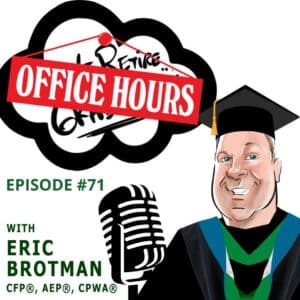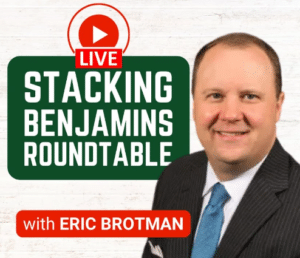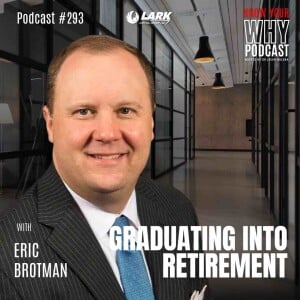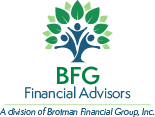In today’s Office Hours, Eric answers Juan’s question: “Is it better to skip investing in the stock market and buy real estate instead?”
It’s not necessarily wise to go all in for either option, and Eric explains the pros and cons of each.
Have a question? Post it in the comments, tweet it to us at @BrotmanPlanning, or post it on our Facebook and it may be used in a future episode of Office Hours!
[00:00:00] Eric Brotman: Welcome to Don’t Retire, Graduate, the podcast that asks you what you want to be when you grow up so you can graduate into retirement with purpose and passion. I’m your host and valedictorian, Eric Brotman. Welcome to Office Hours, where we answer listeners’ questions about financial planning, retirement readiness, and more.
[00:00:20] Eric Brotman: We received a question from Juan who asked, “is it better to skip investing in the stock market and to buy real estate instead?” And Juan, I love this question because it, it can be answered so many different ways. The short answer is probably not. I don’t think there’s one or the other. I think real estate and equities both play a role in wealth building and I, and I don’t know that you should forego one entirely for the other in either direction.
[00:00:46] Eric Brotman: I know in the year 2022, the year that we’ve had in the equity markets makes real estate look very, very attractive because it’s mostly held its value. And there’s a sense, I think in the, in the communities, that we’re starting to see a buying [00:01:00] opportunity that the big sellers market may be over. And that’s particularly in residential real estate.
[00:01:05] Eric Brotman: In that space, I would tend to agree that the, the incredible rise of prices in real estate has cooled and certainly equities have been clobbered in various markets around the world. So I, I understand why you’re thinking this way. What I would say is, if you have cash, real estate is very solid as an investment for a, for a long term, assuming you buy the right properties and have the right mix and diversification, just like anything else you buy.
[00:01:31] Eric Brotman: But if you’re financing, it is suddenly less attractive to finance real estate or any other project than it has been in years. Interest rates have gone up so much that the same mortgage that was available at 2.5 or 3% is now 6.5% or more. And still rising. So there’s a tendency to believe that we can take on a financing project and then refinance shortly thereafter.
[00:01:57] Eric Brotman: That worked great in the 80s when [00:02:00] interest rates were 16% and totally ridiculous and people refinanced to 13 and then 10, and then 7 and so forth. But right now, I’m not convinced that interest rates aren’t gonna stay close to where they are for some time because this is kind of a normal situation, Juan, this is the, the, the normal range is that 6.5 to 7.5% for, for home financing. So we’ve had artificially low rates for a generation stemming from the great financial crisis. And because of that, there’s a tendency to believe that that interest rates are gonna go back to 2% or 3%.
[00:02:33] Eric Brotman: I think those days are not only over I, I think they may never return. So if you have cash and you’re a, a, a willing buyer and you’re able to do some real estate investing alongside some of the other investing you’re doing, I would say “sure, it makes sense”. But if you have to finance the purchase, I wouldn’t wanna see you finance a real estate in a way that was gonna be long term right now any more than I’d wanna see you take a margin loan and finance the purchase of a stock portfolio right now. I, I [00:03:00] never wanna see that happen, but particularly with interest rates back to a normal, if not slightly high range. So equity markets to me, are still a, a viable and engaging place where wealth is created because when you’re buying equities, what you’re buying is you’re buying company earnings.
[00:03:18] Eric Brotman: And as long as corporations have earnings and share those earnings in the form of either dividends or in the form of capital appreciation through R and D and other things, it’s an investment that makes sense in the long run. Yes, it’s more volatile or it feels more volatile. But prior to 2008, there was a sense that real estate could never go down.
[00:03:38] Eric Brotman: And as you’ll recall, assuming you’re old enough to remember in those, in that period of time, real estate did drop, especially in vacation areas, second home areas you know, condo markets and all of that. So real estate can lose value and interest rates are still going up. And so I would say be very cautious with an either or approach.
[00:03:58] Eric Brotman: If you’re going to buy [00:04:00] stocks, don’t buy one– diversify. Buy funds and, and make sure you hold a, a diversified bundle of securities. Do the same thing with real estate. If you want to be in the real estate business, whether it’s commercial or residential, my encouragement to you is be diverse. Don’t buy one property and assume that you now have a, a new financial plan.
[00:04:19] Eric Brotman: I know you have to begin somewhere, but having one property is like having one stock. It means if you have one lousy tenant or one one catastrophe, that’s, that’s an act of nature or any of these other things that can happen. Repairs. Your, your, your return on investment could be not only zero, it could be negative.
[00:04:38] Eric Brotman: And so I want you to diversify away. If you’re gonna have 10 properties and you have one lousy tenant, and the other nine are terrific, the portfolio should be okay. In the same way that if you have 10 stocks and one of them i-i- tanks, the portfolio should be able to withstand that. And so diversifying in real estate and equities does make sense.
[00:04:58] Eric Brotman: And by the way, they’re not the only two asset [00:05:00] classes, and this is not a pendulum that swings between the two. Historically, stocks and bonds have been the pendulum. It’s like a seesaw. When one is up, the other is down. Well, that’s not been true in the last year or two either. You know, year to date, equity markets and bond markets are both down significantly, and as a result, there’s been kind of no place to hide.
[00:05:19] Eric Brotman: And so real estate starts to look like a port in a storm. But if you’re borrowing the cost to carry properties are, it’s high enough now that I would just, if not discourage you, I would at least tell you to take a pause and make sure that the cash flow from whatever you’re buying can cover the escalating costs, not only of not only of taxes which have gone up and of mortgage interest, which has gone up, but also of maintenance and also of energy. So think about it, Juan. I, I, I do think there’s a place for real estate in a portfolio. I happen to like commercial real estate, especially if you can be in the supply chain real estate, and I like to be diverse. I’d rather hold a fund that [00:06:00] holds those things then suddenly be a landlord. But that’s me. And you might, you might feel otherwise, and that’s perfectly fine. Wealth has been made in the real estate markets. It’s also been made in the equity markets, and most wealth building has more to do with personal decision and behavior than it does selection. So I wish you incredible good fortune.
[00:06:19] Eric Brotman: And I encourage you to do, do both, do and do more than just equities and real estate. Hold fixed income, hold private debtor or private private equity hold commodities or other types of asset classes because they will behave differently at different times. And so I encourage you to do basically all of the above and not try to guess.
[00:06:39] Eric Brotman: So Juan, thanks for your question. If you’d like to send us a question for a future episode of Office Hours, please tweet us @BrotmanPlanning or post the question on our Facebook page. I’d like to thank all of you for listening and watching today. We’d love to hear from you, so please send us a message at dontretiregraduate.com or leave us reviews and ratings on your favorite podcast [00:07:00] platform.
[00:07:00] Eric Brotman: Those are priceless to us. If you enjoy our show, don’t keep it a secret. Share it with your friends and family so they can join you on your path to financial freedom. Thanks for coming to Office Hours. We’ll be back next week with another episode and an engaging guest. For now, this is your host, Eric Brotman, reminding you don’t retire, graduate.
[00:07:20] Eric Brotman: Don’t retire, graduate is part of the Evergreen podcast Network.
[00:07:28] Narrator: Securities offered through Kestra Investment Services, LLC. Kestra IS, member Finra, SIPC. Investment Advisory Services offered through Kestra Advisory Services, LLC. Kestra AS, an affiliate of Kestra IS. Kestra IS or Kestra AS are not affiliated with Brotman Financial or any other entity discussed.







